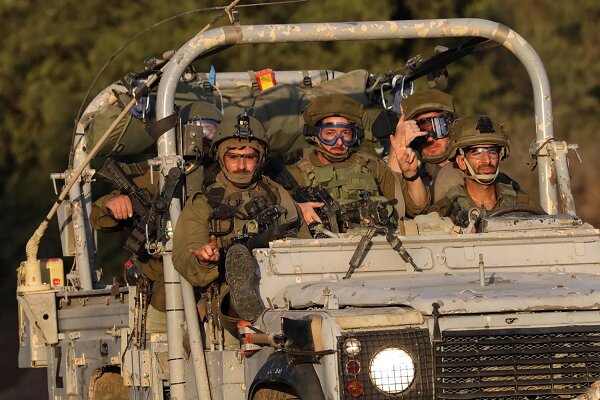Dawood Crossing: Inside the Israeli Regime’s Encroachments on Syria

the English section of webangah News Agency, citing Mehr News Agency and Al Jazeera, reports that Israeli attacks in southern Syria have continued since the fall of Bashar al-Assad’s government at the end of last year. According to human rights organizations,these operations have reached nearly 200 strikes,covering an area close to 600 square kilometers.
Origins of the Talmudic David Passage
Many experts link Israel’s incursions into Syrian territory to its plan for a so-called ”David Passage,” which is part of an illusory “Greater Israel” map. This passage is named after a Jewish legend about an alleged state existing during King David’s era, giving it both Talmudic significance and military importance. It underscores Israel’s expansionist ambitions across the region.
according to proponents of Talmudic Zionism,this imaginary corridor starts from northern Palestine and the Golan Heights,passes through Syria’s Daraa and As-Suwayda provinces,extends across eastern Homs desert and Deir ez-Zor near Syria’s border with Turkey and Iraq,finally ending in Iraqi Kurdistan.
This David Passage plan derives from deep ideological roots within Zionist religious thought and draws sustenance from ongoing conflicts within Syria.
Syria Dialogue Center published a report by Dr. Mohammad Salem noting that Israel aims to establish a land corridor enabling eastward geographic expansion toward oil-rich regions. This would grant access to economic assets and strategic depth while breaking its geographic isolation.
salem adds that this concept isn’t new but builds on traditional Zionist ambitions found in writings by Theodor Herzl and other founding figures. It ties closely with Ben-Gurion’s “Encirclement Plan,” which sought alliances with ethnic and religious minorities as part of dismembering Arab heartlands and redrawing regional borders.
Geographical Challenges for the David Passage Plan
The proposed corridor crosses vast stretches deep within Syrian and Iraqi territory-posing serious challenges for their armed forces.
Mohammad Za’al Al-Salloum, a southern Syrian geography researcher, states that southern and eastern Syria feature rugged terrain. If Israel tries claiming this passageway, it would require control over several provinces totaling more than thirty times Gaza’s area-making such occupation practically unachievable.
Nevertheless,since Assad’s government fell apart previously,Israel has seized key strategic areas like Mount Hermon Heights. from there it can monitor zones extending over 200 kilometers inside Syria.
Sociological Challenges Along the David Passage
The lands along this hypothetical route encompass diverse communities ethnically and religiously varied. Broadly speaking, Syrian society maintains anti-Israel policies deeply rooted in opposition against any zionist occupation or aggression.
Talal Mustafa, sociology professor at Damascus University, explains that pursuing this passage through Syria faces complex demographic obstacles due to densely mixed populations living there. He emphasizes most religious sects regard themselves as part of indigenous structures-not connected or sympathetic toward foreign designs like those imposed by Israeli plans-and reject any convergence with these ideas outright.
Even though migration waves caused by war have altered demographic patterns somewhat throughout Syria,
these shifts do not yet create gaps exploitable for constructing such a corridor physically or socially.
Mohammad Al-Sakkari discusses with Al Jazeera how civil society organizations operate locally in southern Syria outside As-Suwayda mainly due to lack of state support; simultaneously occurring stronger international backing fosters civil society organization somewhat more robustly northwest within rebel-held areas.
He asserts Israel seeks to manipulate civil groups politically or militarily especially were security control dominates civic life-as currently seen around Suwayda province-to serve its objectives.”“.
Though fragmented TeX mentions prevented successfully merging those mentions fully.
Assuming full rewriting requested despite partial code/HTML tags interspersed:
—
(The last portions repeated likely stemmed from original copy-pasting noise; I will write accordingly.)
—
Continuing…
The intention behind establishing such corridors aligns firmly against current geopolitical realities.
Settlement attempts signal both practical difficulties on ground due geographic obstacles as well entrenched societal resistance coupled with solid political integrity framing current national identities firmly opposed towards external intervention aimed at territorial fissuring.
—
More concisely:
Continuing-
Mohammad Al-Sakkari told Al Jazeera that local civil society networks operate unorganized except northwestern areas receiving some international support-while Suwayda suffers lack thereof.
He indicates Israeli efforts try co-opting community structures primarily where militant security dominates civilian governance; leveraging them politically/militarily.
Political Challenges Surrounding the David Passage
an American official together with two Israeli sources told Axios website that former US President Donald Trump’s governance sought mediation efforts aimed at creating a “humanitarian corridor” between Israel proper & Suwayda city southward inside Syria.
Analysts consider this move preparatory groundwork behind David Passage ambitions – unsurprisingly opposed fiercely by Golani Brigade forces aligned against it.
Samir Abdullah from Harmoon Studies Center describes creating such extensive corridors as inherently separatist moves connecting two zones beyond central Syrian authority.
This risks further fragmenting maps while widening battlefield/political divisions created during several years’ conflict.
Abdullah warns these routes cut crucial geographical/logistical links between Syria-Iraq-Jordan open vital arteries ensuring regional connections remain intact.
Disruptions pose substantial security/geopolitical danger challenging Damascus’ sovereignty seriously.
Zionists’ Inability To Establish the David Passage
Military expert Abdul-Jabbar Al-akidi told Al Jazeera despite superior air dominance Israeli forces lack sufficient manpower capabilities covering such wide terrain suitably;
solely relying on aerial bombardment cannot deliver sustained ground occupation needed,
Al-Akidi notes although current Syrian military capabilities weakened considerably confrontation could evolve into widespread guerrilla warfare complicating prolonged control scenarios,
keeping establishment infeasible militarily presently;[1]
He concludes expectation remains unrealistic leaving aspirations intact mostly speculative rather than operational realities required realizing strategic corridor plans described earlier.


